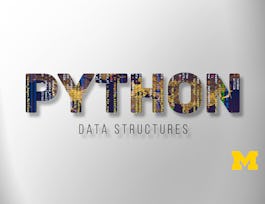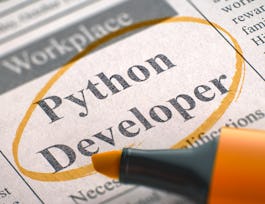This introductory course is designed for beginners and individuals with limited programming experience who want to embark on their software development or data science journey using Python. Throughout the course, learners will gain a solid understanding of algorithmic thinking, Python syntax, code testing, debugging techniques, and modular code development--essential skills for a successful career in software engineering, development, or data science.



(38 reviews)
Recommended experience
What you'll learn
Utilize a Logical Seven Step framework to create algorithms and programs
Create useful test cases and efficiently debug Python code.
Master Python basics (conditionals, loops, mathematical operators, data types)
Develop a Python Program from scratch to solve a given data science problem.
Skills you'll gain
Details to know

Add to your LinkedIn profile
12 assignments
See how employees at top companies are mastering in-demand skills


Earn a career certificate
Add this credential to your LinkedIn profile, resume, or CV
Share it on social media and in your performance review

There are 4 modules in this course
This module, you will learn best practices for developing code in any language by beginning with an algorithm: a stepwise approach to solving a problem. You’ll then apply the concepts by developing your own algorithms and properly identifying when to use specific data types in Python.
What's included
9 videos9 readings3 assignments
This Module, you will learn how to take the logical process of algorithm design and translate an algorithm into functional Python code. You will apply this by correctly identifying proper Python syntax for a given algorithm, and then subsequently by creating your own Python program for a given algorithm.
What's included
13 videos8 readings5 assignments4 programming assignments
This module, you will learn different approaches to testing Python code, and methods for debugging code. You will apply this by conducting a code review, identifying opportunities to use asserts to debug code, and generating your own test cases.
What's included
6 videos8 readings3 assignments
This module, you will learn how to filter and perform operations (logical and mathematical) across a given dataset, and how to create modular code that can be used in discrete pieces. You will apply this by writing your own functions to identify a list item with a given property, and writing a program to calculate a set of conclusions from a given dataset.
What's included
7 videos3 readings1 assignment4 programming assignments2 discussion prompts
Instructors

Offered by
Recommended if you're interested in Software Development

Duke University

University of Michigan

Rice University

Johns Hopkins University
Why people choose Coursera for their career




Learner reviews
Showing 3 of 38
38 reviews
- 5 stars
52.63%
- 4 stars
18.42%
- 3 stars
5.26%
- 2 stars
10.52%
- 1 star
13.15%
Reviewed on Oct 11, 2023
New to Software Development? Start here.

Open new doors with Coursera Plus
Unlimited access to 7,000+ world-class courses, hands-on projects, and job-ready certificate programs - all included in your subscription
Advance your career with an online degree
Earn a degree from world-class universities - 100% online
Join over 3,400 global companies that choose Coursera for Business
Upskill your employees to excel in the digital economy
Frequently asked questions
Access to lectures and assignments depends on your type of enrollment. If you take a course in audit mode, you will be able to see most course materials for free. To access graded assignments and to earn a Certificate, you will need to purchase the Certificate experience, during or after your audit. If you don't see the audit option:
The course may not offer an audit option. You can try a Free Trial instead, or apply for Financial Aid.
The course may offer 'Full Course, No Certificate' instead. This option lets you see all course materials, submit required assessments, and get a final grade. This also means that you will not be able to purchase a Certificate experience.
When you enroll in the course, you get access to all of the courses in the Specialization, and you earn a certificate when you complete the work. Your electronic Certificate will be added to your Accomplishments page - from there, you can print your Certificate or add it to your LinkedIn profile. If you only want to read and view the course content, you can audit the course for free.
If you subscribed, you get a 7-day free trial during which you can cancel at no penalty. After that, we don’t give refunds, but you can cancel your subscription at any time. See our full refund policy.





